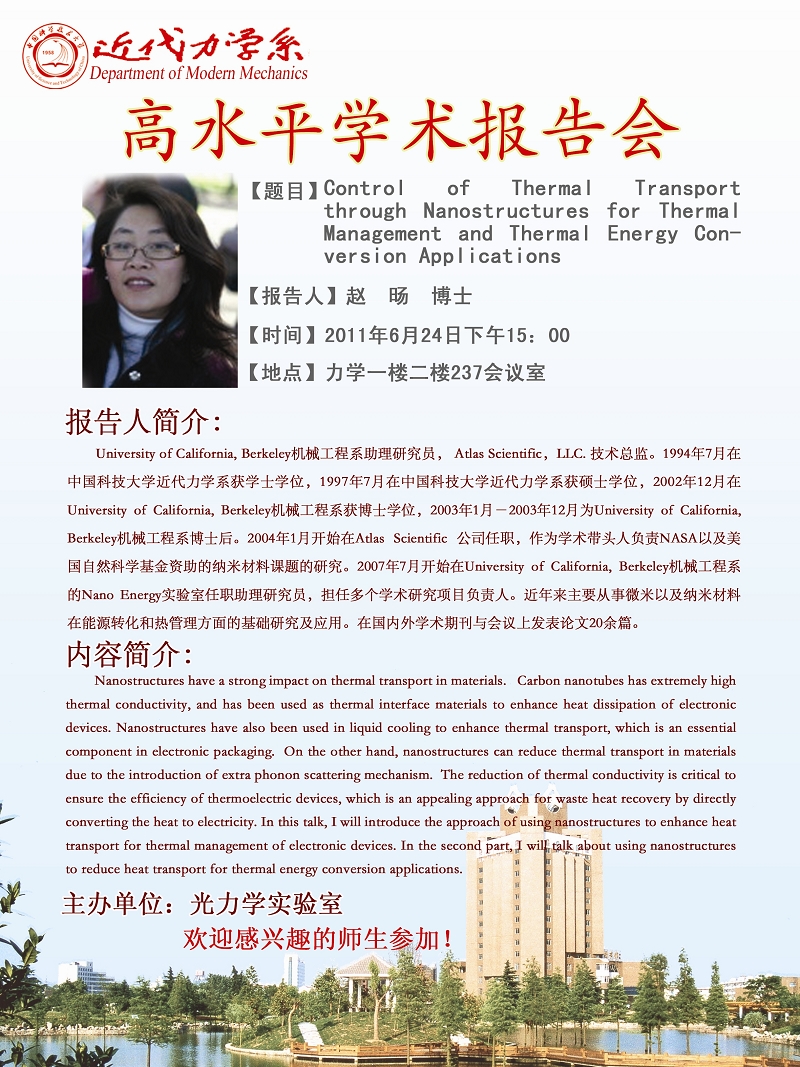Control of Thermal Transport through Nanostructures for Thermal Management
报告题目:Control of Thermal Transport through Nanostructures for Thermal Management and Thermal Energy Conversion Applications
报告人:Dr. Yang Zhao 赵旸
Dept. of Mechanical and Aerospace Engineering, University of Miami
时间:2011年6月24日下午15:00
地点:力一楼 237 第一会议室
报告人简介:
Dr. Yang Zhao received her B.E. and M.E. degrees in Mechanical Engineering from University of Science and Technology of China in 1994 and 1997, respectively, and her Ph.D. degree in Mechanical Engineering from University of California, Berkeley in 2002. She is currently working as a Research Scientist in the Department of Mechanical Engineering at University of California, Berkeley. Her research interests include energy conversion and storage, nanoscale heat transfer, thermoelectrics, thermal management.
赵旸:University of California, Berkeley机械工程系助理研究员, Atlas Scientific,LLC. 技术总监。1994年7月在中国科技大学近代力学系获学士学位,1997年7月在中国科技大学近代力学系获硕士学位,2002年12月在University of California, Berkeley机械工程系获博士学位,2003年1月-2003年12月为University of California, Berkeley机械工程系博士后。2004年1月开始在Atlas Scientific 公司任职,作为学术带头人负责NASA以及美国自然科学基金资助的纳米材料课题的研究。2007年7月开始在University of California, Berkeley机械工程系的Nano Energy实验室任职助理研究员,担任多个学术研究项目负责人。近年来主要从事微米以及纳米材料在能源转化和热管理方面的基础研究及应用。在国内外学术期刊与会议上发表论文20余篇。
内容简介 :
Nanostructures have a strong impact on thermal transport in materials. Carbon nanotubes has extremely high thermal conductivity, and has been used as thermal interface materials to enhance heat dissipation of electronic devices. Nanostructures have also been used in liquid cooling to enhance thermal transport, which is an essential component in electronic packaging. On the other hand, nanostructures can reduce thermal transport in materials due to the introduction of extra phonon scattering mechanism. The reduction of thermal conductivity is critical to ensure the efficiency of thermoelectric devices, which is an appealing approach for waste heat recovery by directly converting the heat to electricity. In this talk, I will introduce the approach of using nanostructures to enhance heat transport for thermal management of electronic devices. In the second part, I will talk about using nanostructures to reduce heat transport for thermal energy conversion applications.

Back

